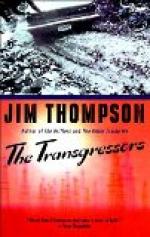Harvey spends the evening at the mansion.
As he and Ethel sit in the drawing room they discussed the events of the day, and speculate on the result that will follow the quarrel with her father.
“My father will regret his hasty words,” Ethel says. “He admires you and places absolute confidence in you. Only yesterday he told me that there was not another man in the world to whom he would confide his business secrets as he has done to you.”
The lovers go to the music room. Harvey’s voice is a remarkably rich baritone. At Ethel’s request he sings a ballad which he has recently composed.
Standing at her side as she plays the accompaniment, he sings.
“The sea of dreams.
“Sing me of love
and dear days gone;
Sing me
of joys that are fled;
Strike no chord of the
now forlorn;
None of
the future dread,
Ah, let thy music ring
with tone
That speaks
the budding year;
The Winter’s blast
too soon will moan
Through
the forest bleak and drear.
Then sing but a line
from the dear old days
We sang
’neath the moon’s soft beams,
When we were young,
in those gladsome days,
While we
sailed on the sea of dreams.
There are no songs that
reach the heart,
Like those
sung long ago.
New singers and their
songs depart;
The old
ones ne’er shall go.
Nor is it strange that
they should be
As balm
to the sad heart;
They tell of love when
it was young,
And all
its joys impart.”
At eleven o’clock Trueman leaves the Purdy mansion and goes to his hotel. To him it is clear that an irreparable breach has been made in the relations between himself and Gorman Purdy. He knows the unrelenting character of the President of the Paradise Coal Company.
“It was a question of right and wrong,” he muses. “I could not see a woman and her child thrown out in the highway, when I knew that it was through my skill as a lawyer that just damages were kept from them. The law was on the side of the company; but justice was certainly on the side of the widow.
“Every day I have some nasty work of this kind to perform. It is making a heartless wretch of me. A man can make money sometimes that comes too dear.”
The next day, at the office, Purdy and Trueman have a long talk. It results in Trueman withdrawing his objections to the assembling of the Coal and Iron Police. As to the widow, a compromise is effected. She is to be set up in business in a neighboring town where her case is unknown.
The thought that to break with Purely would mean to lose Ethel, turns Harvey’s decision when the moment comes to choose between duty and policy.
The work of preparing to defeat the pending strike is at once taken up, Purdy and Trueman working in perfect accord.




